#salon de th
Explore tagged Tumblr posts
Text
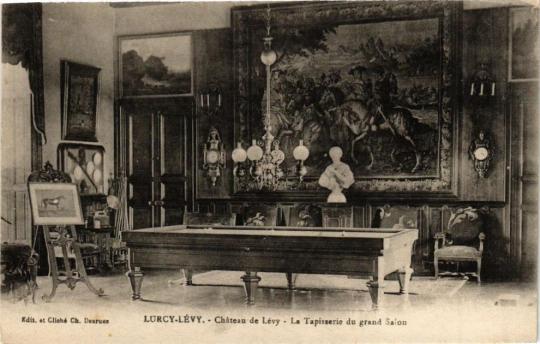
Grand Salon of the 17th-century Château de Lévis, Bourbonnais region of France
French vintage postcard
#old#postcard#de#17th-century#postkaart#château de lévis#french#vintage#briefkaart#postal#region#ansichtskarte#grand salon#ephemera#photography#photo#th#postkarte#tarjeta#france#century#chteau#historic#sepia#lvis#bourbonnais#grand#salon#carte postale
12 notes
·
View notes
Text

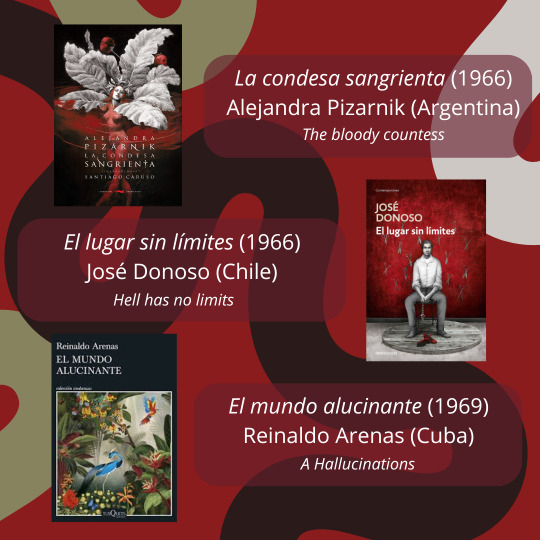
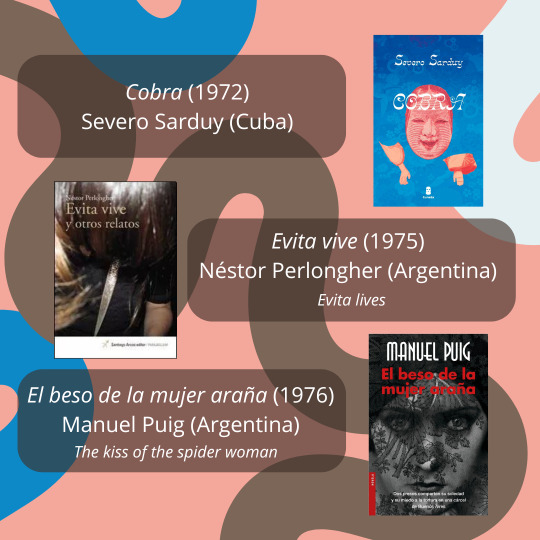







I made a rec list for Latin American books that have queer themes
*DISCLAIMER: "Queer" is not a theme per se. Sometimes it's about identity, sexuality, love, horror, violence, etc. All happening around queer characters.
Most of these deal with pretty heavy themes: prostitution, rape, violence, aids, death. Some representations can be considered "problematic" if you're boring. There are different ways to approach queerness.
Feel free to yell at me about these books/ask where to read them/make recommendations/etc. I definetly have favourites. Also some have movie adaptations.
Descriptions and warnings under the cut
La condesa sangrienta (The bloody countess):
The story of countess Erzebeth Báthory, a medieval hungarian countess know for committing more than 650 murders and inspiring the figure of the vampire. There´s no explicit queer relationships here but there´s absolutely some homoerotism in the narrations of torture. Pizarnik was a lesbian also. TW: disturbing, torture, blood, murder, you should not read this in one go.
El lugar sin límites (Hell has no limits):
The story about la Manuela, a homosexual transvestite that owns half a brothel in a small town. Her daughter owns the other half. The novel shows crudely the misery of forgotten towns and the day to day life of prostitution. There's also a movie. TW: prostitution, murder, homo/transphobia.
El mundo alucinante (A Hallucinations):
A fantasy and free version parody of the Memoires of Fray Servando Teresa de Mier. Known for the uses of magical realism and innovative prose.
Cobra:
Two stories meet. The first is of Cobra, a transvestite, and her transformation. The second of her initiation in a band of black jackers. Erotism and death.
Evita vive (Evita lives):
A controversial book around Eva Perón (after her death) who lives among prostitutes and homosexuals, having orgies and living a life of debauchery.
El beso de la mujer araña (The kiss of the spider woman):
The meeting of two prisoners living in the same cell. One, Valentín, is a political prisoner and the other, Molina, is a sexual deviant. During their weeks there, Molina narrates movies to Valentín and their relationship develops. There's also a movie.
Stella Manhattan:
During Brasil's military dictatorship, the apolitical Eduardo, a.k.a. Stella Manhattan, is expelled form his country for his shameful homosexuality. He returns to the surface as a brazilian counsil in New York and is immediately accosted by a military called Colonel Vianna, a sadomasichist known as the "Black Widow", and by the guerrillas seeking his befall.
Antes que anochezca (Before night falls):
Th 7th of december of 1990 the Cuban author Reinaldo Arenas, in a terminal phase of AIDS, would commit suicide, leaving behing this moving and political testimony, which he finished mere days before taking his own life.
Salón de belleza (Beauty salon):
In a large, unnamed city, a strange, highly infectious disease begins to spread, afflicting its victims with an excruciating descent toward death, particularly unsparing in its assault of those on society's margins. Spurned by their loved ones and denied treatment by hospitals, the sick are left to die on the streets until a beauty salon owner, whose previous caretaking experience extended only to the exotic fish tanks scattered among his workstations, opens his doors as a refuge. In the ramshackle Morgue, victim to persecution and violence, he accompanies his male guests as they suffer through the lifeless anticipation of certain death, eventually leaving the wistful narrator in complete, ill-fated isolation.
Bajar es lo peor (Going down is the worst):
With gothic resonances, Enríquez shows crudely the Buenos Aires of the 90's. The confinement and the paranoia of cocaine, sex as a means to escape or survive, political unbelief, mix with a romantic love that never reaches satisfaction. There's also a movie. TW: drugs, prostitution, rape, suicide.
Loco afán (Mad eagerness):
These "chronicles of aids" narrate stories of homosexuality in Latin America, focused on drag, transvestites and AIDS.
Sirena Selena vestida de pena:
Discovered by Martha Divine in the backstreets of San Juan, picking over garbage, drugged out of his mind and singing boleros that transfix the listener, a fifteen year old hustler is transformed into Sirena Selena, a diva whose uncanny beauty and irrisistable voice will be their ticket to fame and fortune. Auditioning for one of the luxury hotels in the Dominican Republic, Selena casts her spell over Hugo Graubel, one of the hotel's rich investors. Graubel is a powerful man in the Republic, married with children. Selena, determined to escape the poverty and abuse s/he suffered as a child, engages Graubel in a long seduction in this mordant, intensely lyrical tragi-comedy - part masque, part cabaret - about identity (class, race, gender) and "the hunger and desire to be other things."
Tengo miedo torero (My tender matador):
It is the spring of 1986, and Chilean dictator Augusto Pinochet is losing his grip on power. In one of Santiago’s many poor neighborhoods, a man known as the Queen of the Corner embroiders linens for the wealthy. A hopeless and lonely romantic, he listens to boleros to drown out the gunshots. Then he meets Carlos, a young, handsome man who befriends the aging homosexual and uses his house to store mysterious boxes and hold clandestine meetings. And as the relationship between these two very different men blossoms, they find themselves caught in a revolution that could doom them both. There's also a movie.
Adiós mariquita linda (Goodbye pretty pansy):
Chronicles of ire, delation, passion, resentment and loves. Stories of different cities and travels.
Sexografías (Sexographies):
In fierce and sumptuous first-person accounts, renowned Peruvian journalist Gabriela Wiener records infiltrating the most dangerous Peruvian prison, participating in sexual exchanges in swingers clubs, traveling the dark paths of the Bois de Boulogne in Paris in the company of transvestites and prostitutes, undergoing a complicated process of egg donation, and participating in a ritual of ayahuasca ingestion in the Amazon jungle--all while taking us on inward journeys that explore immigration, maternity, fear of death, ugliness, and threesomes. Fortunately, our eagle-eyed voyeur emerges from her narrative forays unscathed and ready to take on the kinks, obsessions, and messiness of our lives. Sexographies is an eye-opening, kamikaze journey across the contours of the human body and mind.
Los topos (The moles):
The son of missing persons of the Dictatorship casually meets a half-brother who poses as a transvestite to investigate ex repressors and cops.
La virgen cabeza (Slum virgin):
When the Virgin Mary appears to Cleopatra, she renounces sex work and takes charge of the shantytown she lives in, transforming it into a tiny utopia. Ambitious journalist Quity knows she’s found the story of the year when she hears about it, but her life is changed forever once she finds herself irrevocably seduced by the captivating subject of her article.
Falsa liebre (False hare):
The darkness at the port engulfs everything. Pachi and Vinicio go deeper into the beach, approaching an improvised party. They are looking for something to numb their bodies, something to finally erase themselves. Summer has been long, and that day was much worse. Not far from there, Zahir fantasizes about his next travel to the capital city or the northern part of Mexico, away from the aunt who keeps asking him for money, controls him through physical violence, and has driven his little brother, Andrik, to run away from the family home and end up in another: a man’s house, who caresses Andrik and then strikes him with the same hand. Now Zahir must not only convince Andrik to start a new life, but make sure they find a way out of that seemingly endless beach. TW: rape, prostitution, violence.
Ladrilleros (Brickmakers):
Oscar Tamai and Elvio Miranda, the patriarchs of two families of brickmakers, have for years nursed a mutual hatred, but their teenage sons, Pájaro and Ángelito, somehow fell in love. Brickmakers begins as Pájaro and Marciano, Ángelito’s older brother, lie dying in the mud at the base of a Ferris wheel. Inhabiting a dreamlike state between life and death, they recall the events that forced them to pay the price of their fathers’ petty feud. The Tamai and Miranda families are caught, like the Capulets and the Montagues, in an almost mythic conflict, one that emerges from stubborn pride and intractable machismo. Like her heralded debut, The Wind That Lays Waste, Selva Almada’s fierce and tender second novel is an unforgettable portrayal of characters who initially seem to stand in opposition, but are ultimately revealed to be bound by their similarities. TW: violence.
Cuerpo a tierra (Body to the ground):
We aren't always owners of our own decisions, sometimes we´re pulled by an irrecognizable impulse and, sometimes, the only truth is that of the body. Betrayal and deception, love and heartbreak, love and search are the protagonists of these stories.
Temporada de huracanes (Hurricane season):
The Witch is dead. And the discovery of her corpse has the whole village investigating the murder. As the novel unfolds in a dazzling linguistic torrent, with each unreliable narrator lingering on new details, new acts of depravity or brutality, Melchor extracts some tiny shred of humanity from these characters—inners whom most people would write off as irredeemable—forming a lasting portrait of a damned Mexican village. There will be a movie by the end of the year. TW: rape, paedophilia, prostitution.
Pelea de gallos (Cockfight):
Ampuero sheds light on the hidden aspects of the home: the grotesque realities of family, coming of age, religion, and class struggle. A family’s maids witness a horrible cycle of abuse, a girl is auctioned off by a gang of criminals, and two sisters find themselves at the mercy of their spiteful brother. With violence masquerading as love, characters spend their lives trapped reenacting their past traumas. Heralding a brutal and singular new voice, Cockfight explores the power of the home to both create and destroy those within it. TW: rape, incest, violence.
Las aventuras de la China Iron (The adventures of China Iron):
1872. The pampas of Argentina. China is a young woman eking out an existence in a remote gaucho encampment. After her no-good husband is conscripted into the army, China bolts for freedom, setting off on a wagon journey through the pampas in the company of her new-found friend Liz, a settler from Scotland. While Liz provides China with a sentimental education and schools her in the nefarious ways of the British Empire, their eyes are opened to the wonders of Argentina’s richly diverse flora and fauna, cultures and languages, as well as to the ruthless violence involved in nation-building.
Mandíbula (Jawbone):
Fernanda and Annelise are so close they are practically sisters: a double image, inseparable. So how does Fernanda end up bound on the floor of a deserted cabin, held hostage by one of her teachers and estranged from Annelise? When Fernanda, Annelise, and their friends from the Delta Bilingual Academy convene after school, Annelise leads them in thrilling but increasingly dangerous rituals to a rhinestoned, Dior-scented, drag-queen god of her own invention. Even more perilous is the secret Annelise and Fernanda share, rooted in a dare in which violence meets love. Meanwhile, their literature teacher Miss Clara, who is obsessed with imitating her dead mother, struggles to preserve her deteriorating sanity. Each day she edges nearer to a total break with reality. TW: violence, cannibalism.
Las malas (Bad girls):
A trans woman's coming-of-age tale about finding a community among fellow outcasts. Born in the small Argentine town of Mina Clavero, Camila is designated male but begins to identify from an early age as a girl. She is well aware that she's different from other children and reacts to her oppressive, poverty-stricken home life, with a cowed mother and abusive, alcoholic father, by acting out-with swift consequences. Deeply intelligent, she eventually leaves for the city to attend university, slipping into prostitution to make ends meet. And in Sarmiento Park, in the heart of Córdoba, she discovers the strange, wonderful world of the trans sex workers who dwell there. Taken under the wing of Auntie Encarna, the 178-year-old eternal whose house shelters this unconventional extended family, Camila becomes a part of their stories-of a Headless Man who fled his country's wars, a mute young woman who transforms into a bird, an abandoned baby boy who brings a twinkle to your eye. TW: rape, prostitution, transphobia, murder, child death.
Nuestra parte de noche (Our share of the night):
A young father and son set out on a road trip, devastated by the death of the wife and mother they both loved. United in grief, the pair travel to her ancestral home, where they must confront the terrifying legacy she has bequeathed: a family called the Order that commits unspeakable acts in search of immortality. For Gaspar, the son, this maniacal cult is his destiny. As the Order tries to pull him into their evil, he and his father take flight, attempting to outrun a powerful clan that will do anything to ensure its own survival. But how far will Gaspar’s father go to protect his child? And can anyone escape their fate? Moving back and forth in time, from London in the swinging 1960s to the brutal years of Argentina’s military dictatorship and its turbulent aftermath.
Tesis sobre una domesticación (Thesis about a domestication):
A single transvestite is enough to undermine the foundations of a house, to untie the knots of compromise, to break a promise, to give up a life. The familiy clings to brief moments of happiness without noticing it´s been defeated since the start.
La hija única (Still born):
Alina and Laura are independent and career-driven women in their mid-thirties, neither of whom have built their future around the prospect of a family. Laura is so determined not to become a mother that she has taken the drastic decision to have her tubes tied. But when she announces this to her friend, she learns that Alina has made the opposite decision and is preparing to have a child of her own. Alina's pregnancy shakes the women's lives, first creating distance and then a remarkable closeness between them. When Alina's daughter survives childbirth – after a diagnosis that predicted the opposite – and Laura becomes attached to her neighbor's son, both women are forced to reckon with the complexity of their emotions, their needs, and the needs of the people who are dependent upon them. TW: child disease, family violence.
Huaco retrato (Undiscovered):
In an ethnographic museum in Paris, Gabriela Wiener is confronted with her unusual inheritance. She is visiting an exhibition of pre-Columbian artefacts, the spoils of European colonial plunder. As she peers through the glass, she sees sculptures of Indigenous faces that resemble her own - but the man responsible for pillaging them was her own great-great-grandfather, Austrian colonial explorer Charles Wiener. In the wake of her father's death, Gabriela begins delving into all she has inherited from her paternal line. From the brutal trail of racism and theft that Charles left behind to revelations of her father's infidelity, she traces a legacy of abandonment, jealousy and colonial violence, in turn reframing her own struggles with desire, love and race. Seeking relief from these personal and historical wounds, Gabriela turns to the body and desire as sources of both constraint and potential freedom.
Sacrificios humanos (Human sacrifices):
An undocumented woman answers a job posting only to find herself held hostage, a group of outcasts obsess over popular boys drowned while surfing, and two girls suspect sinister behavior from the missionaries lodging in their home. Simultaneously terrifying and exquisite, Human Sacrifices is "tropical gothic" at its finest. Ampuero considers the decay and oppression beneath the surface of our humid and hostile world, where those on the margins must pay the price for the comfort and safety of the elite. These twelve stories contemplate the nature of exploitation and abuse, illuminating the realities of those society consumes and leaves behind.
Soy una tonta por quererte (I'm a fool to want you):
In the 1990s, a woman makes a living as a rental girlfriend for gay men. In a Harlem den, a travesti gets to know none other than Billie Holiday. A group of rugby players haggle over the price of a night of sex, and in return they get what they deserve. Nuns, grandmothers, children, and dogs are never what they seem. These 9 stories are inhabited by extravagant and profoundly human characters who face an ominous reality in ways as strange as themselves.
Las indignas (The unworthy):
A searing, dystopian tale about climate crisis, ideological extremism, and the tidal pull of our most violent, exploitative instincts. TW: death, animal death, rape, cults.
#queer lit#queer#queer literature#latin american literature#queer latin american literature#literature#book recs#queer book recs
123 notes
·
View notes
Text
One of the first twentieth-century works to try to redress this pathological omission of women from what has conventionally been written as history is Mary Beard's Woman as a Force in History. Showing how, despite male dominance, women have in fact been important shapers of Western society, this pioneering woman historian led the way back into prehistory as a source of the lost human heritage. Of particular relevance here is Beard's documentation of something that to conventional historians would seem even more outrageous than the correlations shown by Winter and McClelland between "feminine" and "masculine" values and critical historical alternatives. This is that periods of the rising status of women are characteristically periods of cultural resurgence.
From the perspective of the Cultural Transformation theory we have been developing, it is hardly surprising to find a correlation between the status of women and whether a society is peaceful or warlike, concerned with people's welfare or indifferent to social equity, and generally hierarchical or equalitarian. For, as we have seen throughout this book, the way a society structures the relations between the two halves of humanity has profound, and highly predictable, systems implications. What is surprising is that, without any such theoretical framework, writing at the beginning of this century, Beard could see these patterns and remark on them in what is still one of few attempts to chart the activities of women in Western history.
In Women as a Force in History, Beard remarks on "the wide-reaching, and influential activities of Italian women in the promotion of humanistic learning" during the Renaissance. She notes that this was a time when women—along with "effeminate" values like artistic expression and inquiry—were beginning to free themselves from medieval church control. She documents that in the French Enlightenment of the seventeenth and eighteenth centuries women played similarly critical roles. Indeed, as we will see, during this period—which launched the secular revolt against what Beard calls "the barbarisms and abuses" of the old regime—it was in the "salons" of women like Madame Rambouillet, Ninon de Lenclos, and Madame Geoffrin that the ideas for what later became the more humanist, or in our terms more gylanic, modern ideologies first germinated.
This is not to say that women have not also helped to keep men and "masculine" values in power. Despite the emergence of great figures here and there, women's part in our recorded past was by necessity largely played in the androcratically prescribed role of the male's "helper." But as Beard repeatedly shows, although women have helped men fight wars, and sometimes even fought in them, theirs has generally been a very different role. For not being socialized to be tough, aggressive, and conquest-oriented, women in their lives, actions, and ideas have characteristically been "softer," that is, less violent and more compassionate and caring. For example, as Beard remarks, "one of the earliest—and perhaps the first—rivals of the hymnology of war, hatred, and revenge made immortal by Homer was the poetry of an Aeolian woman called Sappha by her people but uniformly known in later times as Sappho."
This insight is also found in another pioneering work focusing on the role of women in history: Elizabeth Gould Davis's The First Sex. Like books by other women trying to reclaim their past with no institutions or learned colleagues for support, Davis's book has been criticized for veering into strange, if not downright esoteric, flights of fancy. But despite their flaws and perhaps precisely because they did not conform to accepted scholarly traditions books like this intuitively foreshadow a study of history in which the status of women and so-called feminine values would become central.
Like Beard's, Davis's book puts women back into the places from which they were erased by androcratic historians. It also provides data that make it possible to see the connection at critical historical junctures between the suppression of women and the suppression of feminine values. For instance, Davis contrasts the Elizabethan age with the Puritan regression that followed, marked by virulent measures to repress women, including "witch" burnings.
But it is primarily in the works of today's more exacting feminist historians and social scientists that we can find the data needed to flesh out and develop a new holistic theory of gylanic-androcratic transformation and alternation. These are the works of women such as Renate Bridenthal, Gerda Lerner, Dorothy Dinnerstein, Eleanor Leacock, JoAnn McNamara, Donna Haraway, Nancy Cott, Elizabeth Pleck, Carroll Smith-Rosenberg, Susanne Wemple, Joan Kelly, Claudia Koonz, Carolyn Merchant, Marilyn French, Francoise d'Eaubonne, Susan Stownmiller, Annette Ehrlich, Jane Jaguette, Lourdes Arizpe, Itsue Takamure, Rayna Rapp, Kathleen Newland, Gloria Orenstein, Bettina Aptheker, Carol Jacklin, and La Frances Rodgers-Rose and men such as Carl Degler, P. Steven Sangren, Lester Kitkendal, and Randolph Trumbach, who, painstakingly, often using obscure, hard-to-find sources like women's diaries and other hitherto ignored records, are gradually reclaiming an incredibly neglected half of history. And in the process, they are producing the missing building blocks required to construct the kind of historical paradigm needed to understand, and move beyond, the one-step-forward-and-one-step-back alternations of recorded history. For it is in the new feminist scholarship that we begin to see the reason behind something the French philosopher Charles Fourier observed over a century ago: the degree of emancipation of women is an index of the degree of a society's emancipation.
-Riane Eisler, The Chalice and the Blade: Our History, Our Future
22 notes
·
View notes
Text
Fucking around with a prompt I saw for Malevolent but have repurposed for SpideyPool bc I have brain rot. (Ugh. Save me.)
Wade Wilson is a mercenary that works for The Organization (very ominous) and he completes missions with the help of a handler. A comms person in his ear feeding him intel and keeping him in line. He's recently been assigned a new handler.
/scene start/
“Take a left at the next street, then an immediate right.”
A muscle in Wade’s shoulder blade twitches as the voice crackles into his ear. This new comms guy is fine, but he’s still not used to hearing someone that isn’t Cable on the line. Wade and Cable had an understanding that this new guy wouldn’t know anything about.
It’s the height of fucking absurdity that Wade is just supposed to roll with some noob rattling instructions into his ear. He and Cable had trust. Namely, Cable trusted that Wade would do the most unhinged thing possible in any given situation and Wade trusted that Cable would be able to get him out of it.
There’s no trust with what’s-his-face. Her face. Their face?
Wade doesn’t fucking know and that’s the whole point. He’d put effort into making sure that he and Cable could work together flawlessly. Yeah, Cable hadn’t exactly been ecstatic that Wade had stalked enthusiastically followed Cable for a year, but that was just business sometimes.
Now Wade has to start all over again. Fuck th—
“Left. Now.”
Wade cranks the bike to the left, putting his foot down as the back end fishtails him around the arc and he can gun it down the alley.
“Right. Now.”
Wade skids again, the back wheel clipping the corner of the building and nearly dumping him onto his face.
“Your other right. Christ.”
“Well,” Wade grunts, muscling the bike back into balance. “Guess I’m takin’ a shortcut.”
The only response is a cute little growl followed by the sounds of frantic key tapping and aggressive paper shuffling.
That’s more like it.
Wade can’t have his new handler letting the title go to their head. No one handles Wade.
Wade is unhandleable.
“U-turn at the next light. Aim for Benton Street.”
“Sure thing, Siri.”
The traffic light switches to green just as Wade shoots out of the alley. He cuts behind a older model truck running the intersection then banks the motorcycle hard, nearly dumping it before coaxing it into a half-circle.
“Benton, Benton, Benton,” Wade mutters to himself, eyes scanning the street signs.
“Between the Starbucks and the hair salon.”
The tires on the bike grab just as that corporate green and white mermaid catches Wade’s eye. He eases off the throttle to get the bike pointed in the right direction, then cranks it back again, speeding between coffee and coifs.
“Where to now, Google Maps?”
Wade is pretty sure that’s the sound of teeth grinding. It puts a little smile on his face, and he has to use most of his willpower not to wiggle in the seat. He does wiggle a little though because he’s not a puritan.
Cable would have given Wade a stern talking to by this point, reminded Wade that he’s doing this for the greater good, that he needs to protect everyone else in the organization by not getting caught, scolded him for leaving a weapon at the scene.
blah blah blah
yada yada yada
He might actually be able to get behind a comms runner that doesn’t sit in his ear like Jiminy Fucking Cricket and judge him the whole time. That’s the ticket. He needs to think about this like being freed from oppression. The next time he wants to take a tooth as a trophy or de-glove somebody’s hand before killing them, there won’t be anyone to say no.
“Duck.”
“Wha—?”
A hot line of pain sears across the outside of Wade’s shoulder and he looks down to see blood oozing from a bullet wound, dripping down the sleeve of his leather jacket. Well… not his leather jacket.
“I just stole this jacket,” he whines.
“DUCK, asshole,” the voice barks in his ear and Wade is leaning over the handlebars, knees gripped tight to the gas tank, before his brain can even process the words.
Ungh.
Okay.
A bullet shatters a shop window to Wade’s left and he quickly readjusts his perspective.
If Wade’s new comms guy can get him out of this alive, he might be willing to give it a chance.
After all, he usually pays $1.99 a minute to get someone to talk to him like that.
#fanfic#fic wip#spideypool#deadpool#wade wilson#spider-man#peter parker#peter parker / wade wilson#yeah ofc peter is totally the comms guy#we'll see if this goes anywhere
21 notes
·
View notes
Text
Portrait of a Dead Girl
Summary:
Alina Starkov was given to Duke Aleksander Morozova of Os Alta in marriage when she was fifteen years old. Within a year, she was dead. The official cause of Alina's death was marked as putrid fever, but many at the time believed, and many in the future will go on to believe, that she was poisoned by her husband.
-
This fic is completely inspired by The Marriage Portrait by Maggie O'Farrel, which is a work of historical fiction based on the real lives of Duchess Lucrezia d'Este (née de' Medici) and Duke Alfonso ii d'Este of Ferrara. You don't need any prior knowledge of The Marriage Portrait or history to read and enjoy this fic, but know that my writing is very much going to mimic that of O'Farrel in format and although I'm hoping to write the story in my personal usual writing style I will definitely be borrowing a lot of my descriptors, symbols, and so on and so forth from O'Farrel - there will be some of mine too though :)
Warnings for this chapter: Briefly mentioned violence and child abuse
If anyone would like to be tagged in future chapters let me know :)
AO3 link
Chapter 3 - A Peculiar Fancy
Os Kervo, nine years ago
The Starkov children did not have free run of their father’s dvorets but were, until they were grown, enclosed to their nursery chambers and the adjoining classrooms, the covered walkway where they could take air, and - very occasionally - the tall battlements that surrounded it like the brim of a hat. Ana Kuya, who claimed to have been all over the dvorets and to have seen every room, would tell them that there was an entire chamber just for weapons, filled with swords and suits of armour lined up like soldiers waiting along the walls, and another filled with books.
“Book after book after book,” she said, helping seven year old Alina with a tricky button on her smock, “on shelves that reach higher than your head, or mine,”
“Higher than your head?” asked Alina, in astonishment, because other than her father Ana was the tallest person that she knew, “Are they taller than Papa?”
“They are,” she said, nodding wisely, “They are even taller than your papa. It would take more than a whole lifetime to read them all,”
There was another salon that showed maps of every country in the world and of all the stars in the sky. There was a vault lined with iron and lead, with the heaviest door they could imagine and lined with more locks than they could picture, where their mama’s jewels - especially the ones she brought with her from Shu Han - were kept safe, although Ana had to admit that this one she had not seen with her own eyes. No-one had; no-one could unlock it but their papa.
“And there is a great long room,” Ana said, as she rubbed Alina’s cheeks with a damp cloth, “With the ceiling all so beautifully decorated,”
“Decorated with what?” Alina asked, trying and failing to lean away from the washcloth.
“Oh, with angels, and Saints, and great warriors fighting battles,” Ana placed her hand on top of Alina’s head to hold her still, “That kind of thing,”
When Alina lay awake at night, trying to sleep, she would often think about these rooms, try to picture them and imagine walking amongst them all. Her sister Eva said her favourite to see would be the jewels; Zoya said she’d like to see the painted ceiling; Vadim, who would be Duke one day, told them all very loftily that he had actually already seen them all, some more than once. Alexei rolled his eyes at that, and Vadim kicked him in the shin. Nobody asked Alina which room she would like to see and she did not announce it, but if questioned she would have said the menagerie beneath the floors of the dvorets , where she’d heard their father kept two lions. The lions that he would show to honoured guests and would sometimes even pit against other animals for sport but that Alina and her siblings had never been permitted to see, she was sure, must be an incredible sight to behold. She was desperately excited to see them - though in the end it wasn’t the lions that ended up luring Alina downstairs like a siren call, but the new animal that arrived that year.
Some months ago, a foreign dignitary had arrived to present Gregor Starkov with a grand oil painting of a tiger, and though Alina had not seen the piece herself she had heard that it was bigger and taller than three men standing next to each other, and that it was most wonderfully beautiful.
“A DeKappel original,” the dignitary had said, with a hint of what was presumably pride but was difficult to discern beneath the Kerch accent that so thickly coated his words, “One of a kind,”
“And he has seen one of these creatures first hand?” asked Gregor, his mind already turning.
A tiger, he thought, would make an excellent addition to his collection.
“Of course, Your Grace,” the dignitary told him, “Such a piece could never have been completed without a study of the creature itself; he took a grand expedition through Shu Han to produce it,”
Yes, yes… he wanted one. He wanted one badly.
Keeping the heavy sigh he heaved at this announcement private, the Duke’s advisor - an unsmiling man whose surname was Perlich and whose first name Alina never learned, because everyone only ever called him Perlich - made the appropriate notes even as he desperately hoped that Gregor would be persuaded against the plan. Perhaps he would even forget that he had conceived of it in the first place, he was, after all, rather fickle and apt to many a sudden affectation that would dissipate just as quickly as it had arrived, and they were already occupied by public unrest near Novokribirsk. But the Grand Duke could not be convinced of anything, and even before Perlich had managed to make a start on the order the enclosure had been entirely prepared; the floors swept clean, the bars reinforced.
The peculiar fancy took a long time to travel in its course and a longer time to complete its execution, but eventually a tiger was captured in Southern Shu Han and dragged the long journey up to Western Ravka, and finally into Os Kervo itself. It was brought into the city overnight, caged and lashed to a cart to be pulled by six terrified mules, so that no-one would see its entry in daylight. No-one would see them, no-one hear them. No-one would ever find out.
No-one, that is, except for little Alina Starkov.
She lay on her back, tucked into a bed with her sisters and staring at the distant ceiling of the nursery in the dark. Alina always had trouble sleeping, not just because she was small for her age and Zoya, who always slept in the centre of the bed, had a habit of stretching out and almost shoving her right off the mattress, but because her mind whirred too quickly and she didn’t know how to slow it down, how to tell it that it was time to rest. It was Alina alone who lay awake in the nursery that night, Alina alone who heard a strange, distant cry as a cart trundled through the dvorets gates, Alina alone who slipped from the bed and tiptoed to the window to peer out and try to find a source of the sound. It was a low, hollow call that severed the night mournfully before dying away, and although Alina could see nothing in the impenetrable darkness beyond the glass and it would have been easy enough to convince herself that her imagination, which so often she was told was too wild, too much, too unruly, had played a trick on her, she knew that she had heard something. The dvorets was a place of strange acoustics; even at the age of seven Alina had noticed this, and she had found that if she pressed her ear against the right folds of a wall panelling, or the frame of a door, it was possible to discover all kinds of intriguing things. She had heard the ordinations of cardinals, the announcements of new siblings soon arriving, the rumoured warnings of an army gathering on the Eastern side of the Unsea, and even that there was a tiger coming from Shu Han, due to arrive any day. Conversations she wasn’t supposed to hear were always the most interesting ones, she had discovered.
The cry sounded again; a desperate yearning, a lonely sob. Alina would have expected a tiger to roar, but as soon as she’d made the connection between her eavesdropped conversation and this sound it made more than perfect sense to her. It was the sound of a creature captured against its will, a creature whose desires have all been disregarded.
Alina turned away from the window and studied the door on the other side of the nursery. She knew which floorboards creaked and which did not, which of her siblings were the lighter sleepers - though none quite so light as her - and for all the clumsiness she had so often been chastised for, particularly in the dance classes for which she had no real gift, she knew very easily how to glide noiselessly across this room, across the next, and out into the corridor. She crept away from her sisters, past her brothers heaped together in their bed, past the cot where baby Petro slept, past the two nurses sleeping near the door, and eased back the bolts. After a brief pause, to listen for Ana Kuya’s breathing past the next wall to be sure she was asleep, she ran her hand along the correct panel opposite the door to the nursery until she found the little brass catch. The panel swung inwards, and Alina vanished.
Ana Kuya and the other nurses were all from Keramzin on the other side of the Unsea, Ana claimed because the best nursemaids were found only here and refused to hire from anywhere else but Alina suspected that the real reason was so they could converse in the local dialect of Keramzin without the rest of the household knowing what they’d said. What Ana Kuya did not know, however, was that Alina had a very keen ear for figuring out a good portion of what they said, something she would only get better at, and only continue to keep secret, as she grew, and it was from the nurses’ conversations that she had learned about the warren of secret passageways within the dvorets , as well as their intended purpose - for the Duke and his family to escape if the palace were attacked.
Alina had found many of them, though she was sure not all. This particular passage was a shortcut that carried her down to the larger courtyard on a set of winding, narrow, spiral steps with no bannister, the stone cold and slick beneath her feet, the air around her impossibly dark, and Alina had to bunch the hem of her shift into one hand so she would not trip on it, her other she set flat against the wall for balance. How long would it take for someone to find her if she fell and injured herself here? Closeted between the very walls as she was, who would ever hear her shout or cry? She swallowed tightly. She was not afraid. Besides, the thought of the creature waiting for her below spurred her on. She would see the tiger. She had to.
The small space the stairs emptied out into led her on to another corridor that, in turn, gifted her with a window through which the courtyard was made visible. She checked more than twice even though she could see no-one, but the corridor was empty of guards or servants now, neatly tucked beneath the velvet blanket of black sky as the city was. Alina took a breath before she stepped out to enter it, like she was crossing a threshold, like this was a promise - though she did not know if she was making one, or breaking it. Her fingertips pressed against the cold sill as she leaned onto tiptoes to see out of the window, having to pause and wipe away a cloud that her breath formed across the glass.
She saw the mules and the cart, a crowd of her father’s men in golden crested livery, and then - just for the briefest, flashing second, she saw it. A lithe shape that did not so much pace as pour itself from place to another, as though its entire form was molten and simmering. It was difficult to distinguish the dark bars of the cage from the dark stripes patterning the tiger’s side; the creature carried the marks of her prison on her body, as though she had always been branded for exactly this purpose, as if captivity had been her destiny all along.
And then the mules jerked forwards, the cart disappeared through a stone archway with the men following after it, and Alina was left staring at the empty cobblestones beneath the flickering braziers of the courtyard. It was as if nothing had ever been there in the first place.
*
When Alina woke the morning after the tiger had arrived, it took her a moment to realise that the bedroom was quite so quiet because she was the last of her siblings to rise. Her face was buried deeply into her pillow and when she lifted her head she realised she was in the centre of the bed, she was alone, she was not entangled in Zoya’s arm or squished neatly between her and Eva like the filling of a sandwich. Usually Alina slept on the edge and usually the other two seemed to like it that way, but on the occasion that Alina might wake up from a nightmare and neither of them were in too sour a mood about it they would pull her in between them to be cocooned by the heat of the duvet and themselves. But they weren’t here now, and had been absent long enough for the sheets next to where Alina lay to feel cold. She peeled herself off the mattress and got to her feet, listening to the sounds of her siblings at breakfast through the open door. She stretched her arms and legs and wondered briefly if she should just flop back into the quilt until she remembered the image of the tiger and was possessed by one thought, one goal: she had to see that creature up close. She had to.
Could she sneak down to the menagerie? She knew of no passageway that would get her there and someone would surely apprehended her if she just wandered to it out in the open, so how… she would have to be smart about this. She dressed hastily and shoved her feet into her little shoes, then slipped through the door.
Along one side of the table sat her four elder siblings, a neat little cascade of height like a little staircase as they sat in age order. They were all exactly one year apart - Zoya was twelve, Vadim was eleven, Eva was ten, Alexei was nine. On the other side the three baby boys were sitting with their nurses and arranged in the same fashion; Artur was three, Ivo almost two, baby Petro not yet a year. There was a baffling vacancy around little Alina, a gap of more than two years wide either side of her. No children occupied those spaces, between her and Alexei or her and Artur. She’d once asked Ana why this was, why she had no siblings closer to her in age like all the rest.
“Maybe your poor mother needed a rest,” was all Ana had said, exasperatedly, because Alina had been particularly difficult that day.
Now she approached the table slowly, not sure where to go as her usual chair was currently occupied by the wetnurse and it seemed no other place had been set for her. She just stood there, between the wall and the table, watching her siblings take their meal like she was an interloper, like they were a scene that she was studying, or like she was a portrait on the wall behind them and none of them were interested enough to look back into her painted eyes. Then she stepped forwards, leant over the table, and snatched a hunk of bread from one of the centre plates to rip apart, still standing, with her teeth before she shoved it down her throat.
“Alina!” snapped Ana Kuya, releasing the wriggling Artur from her lap to stand up, “Where on earth are your manners?”
Alina looked up from the bread, almost surprised to have been noticed, and watched Artur run straight across the room to use his new found freedom for the grand purpose of playing with some wooden blocks. Ana Kuya was frowning as she marched across her, taking the bread straight from her hands and setting it onto a clean plate.
“What has happened to your hair? You look like you’ve been out in a storm - and why is your smock on backwards?”
Alina opened her mouth to reply, closed it again.
“This child,” Ana muttered, presumably to the other nurses or just herself, motioning for Alina to raise her arms so she could swiftly yank the smock up over her head and bring it back down again the right way, “will be the death of me,”
Alina stood very still and let Ana move around her, fixing her clothes and combing the knots out of her hair, as though she were simply a statue to be perfected before display. This was the only way to be; Ana Kuya did not truck with disobedience or fidgeting or wriggling. This was her nursery, she would remind them, and things would be done her way. Eva had once, shocking them all not only in her words but in how her punishment was carried out, earned herself a swift lashing with a switch and bed with no supper when she’d muttered it’s my mother’s nursery, you old cow. But Ana Kuya did not hold grudges - and neither, it seemed, did Eva.
Alina’s ear was burning hot under Ana’s grip, where she was holding her to keep her still as she brushed, and she tried not to wince as the comb caught a heavy knot in her hair. If you cried out Ana Kuya would probably take the brush out and wrap it against your legs before she continued. Alina closed her eyes and took herself away from the moment, picturing the menagerie far below her feet. She imagined pacing across the floor towards the bars of the tiger’s cage, hand held aloft for the creature to see as they approached each other. The tiger would not be afraid or angry, she would be calm and comforted, she would recognise something in Alina that she knew was in herself and -
“What are you doing ?”
Zoya’s voice brought her back to the nursery, as did a sharp tug on her ear from Ana Kuya. Eva was in fits of giggles, as were Vadim and Alexei, but Zoya looked downright disturbed as she surveyed Alina, as though simultaneously concerned for her sister and quite entirely put off by her presence.
“What?”
Eva covered her mouth, bent double with mirth, as Alexei pulled some stupid face to mock Alina.
“You-” Eva barely managed to say between her breathy laughs, “You were-”
“I was what ?” Alina cried, cheeks flooding with colour.
When all she got was further laughter, she turned and flung her arms around Ana Kuya, burying her face in her familiar middle. Ana stroked the back of her head, about the closest she was going to get to returning the hug.
“You were growling ,” Zoya’s icy voice cut through the laughter in a factual, disapproving tone.
That was how Zoya said most things, but Alina welcomed it - at least now, anyway. She wasn’t laughing at her.
“You are so funny, ‘Lina,” Eva continued, her voice still high and musical with laughter, “Do you think you are a bear?”
Ana’s hand moved down Alina’s back in repetitive, firm, slow movements between her shoulder blades as the girl burrowed closer to her, inhaling her familiar, comforting scent and refusing to peel herself out from the folds of her dress.
“Come along now,” Ana told her, gently but with insistence, “Let go. It’s time for lessons,”
Alina released her unhappily, and followed her still-giggling siblings into the classroom.
#thanks for reading <3#portrait of a dead girl#shadow and bone#grishaverse#leigh bardugo#sab#s&b#s&b trilogy#shadow and bone trilogy#grisha#grisha trilogy#the grisha series#alina starkov#mal oretsev#genya safin#the grisha trilogy#anti darkling#anti darklina#shadow and bone fanfic#shadow and bone fic#grishaverse fandom#grishaverse fanfic
3 notes
·
View notes
Text
Palace Whispers
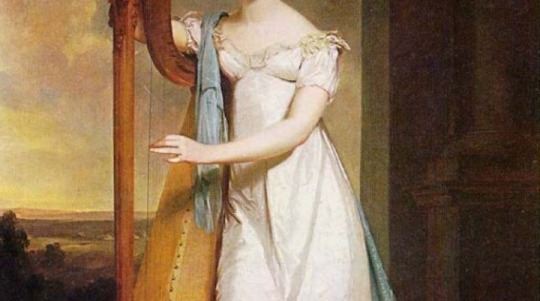
It was to be the greatest event of the 19th century - the coronation of Napoléon as Emperor of the French! Not in Aix-la-Chapelle or Reims, but in Paris, in Nôtre Dame! And His Holiness Pope Pius himself came to Paris to crown Napoléon!
Th imperial court had moved from Saint Cloud back to the Tuileries. Since my rank as a lady-in-waiting to the Empress was in the lower category as simple "Dame du Palais", I had far less importance than the "Dame d'honneur", the "Dame d'atour", or the "Dame d'accompagner". So the busy preparations for the coronation only affected me peripherally. But since everyone was so excited, the mood at court was more than brilliant! I enjoyed my service to the Empress, although I always -always! - entered her apartments with the trembling fear of meeting "him"! But the Emperor was so busy that he seldom came to see us. Once he appeared when I was playing the harp. The Empress never entered her salon until after eleven in the morning. Then she would chat with us about fashion or gossip. Some of the ladies were embroidering, someone was reading something, or I was playing the harp. When the Emperor came and I was playing a melody by Salieri, I jumped up and curtsied to the Emperor like all the ladies. But the Emperor did not notice us, so I allowed to continue plucking my harp. I only glanced at him once. My heart was pounding! It was magnificent to see how lovingly the imperial couple treated each other. Aunt Joséphine beamed at the Emperor so tenderly that one couldn't help but smile. But then my eyes fell on Madame de Vaudey and she looked at the Emperor not tenderly, but with pure desire! I saw a real greed for him in her eyes. It was almost indecent! The Emperor only gave her a brief glance. But her cheeks glowed with satisfaction! Élisabeth de Vaudey had everything I didn't have: she was tall, blonde, with big breasts that she juggled so skillfully in her cleavage as if they were about to sprang out at any moment. It was indeed fascinating to watch her, she loved to move her soft body with her slim waist and round bottom were more than provocative. But her voice sometimes sounded vulgar, too loud and exaggerated. Élisabeth had a self-confidence that I could only dream of. Her singing voice was really beautiful, but she never asked me to accompany her singing on the harp. She ignored me, never greeted me, never spoke to me. It seemed that she would never forgive me for the magical moment when I wore the Emperor's coat. The Empress herself was not at all jealous of the incident. "You looked so sweet, Adèle! All of Paris is talking about the Emperor's gallantry! Parisians love that kind of thing...and why not!" I remained a child to her, little Adèle, whom she had to protect.
One afternoon, however, the Emperor suddenly burst into the Empress's salon, beaming with joy! We were embroidering, nibbling on pastries and drinking a glass of Anisette. It was a somewhat boring afternoon, which was saved by the visit of the Emperor. We were still kneeling in our curtsy when I heard the Emperor say to Joséphine: "The Pope has arrived in Fontainebleau!" He took his wife's hand and kissed it passionately, with his eyes closed. Joséphine smiled happily. "Mesdames...the Pope is in Fontainebleau!" We applauded, and the Emperor finally looked at us. I quickly looked back at my embroidery. A minute or two passed...then the Emperor unexpectedly came to the small table where I was sitting with Félicité. He reached for my glass of Anisette, smelled it, took a sip, took another sip and then asked me: "Madame Duchâtel, do you know that Italian melody....mia dolce ragazza...avanti...facciamo l'amore...avanti...mia dolce ragazza...la...la...la..." He hummed the song loudly to himself. I looked up at him, uncertainly. "No, Your Majesty, unfortunately I do not know that melody." Then he looked at the Empress and said: "I can't get that damn melody out of my head!" Completely unexpectedly, Élisabeth then called out: "Sire, I know that melody...mia dolce ragazza..." she began to sing. The Emperor nodded, but turned around and slowly walked towards the door. I don't know what demon came over me at that moment, but I reached for my glass and put my lips exactly where the Emperor's mouth had touched the glass before! I closed my eyes blissfully for a second, then looked up at him. The Emperor was watching me. He smiled, knowingly!
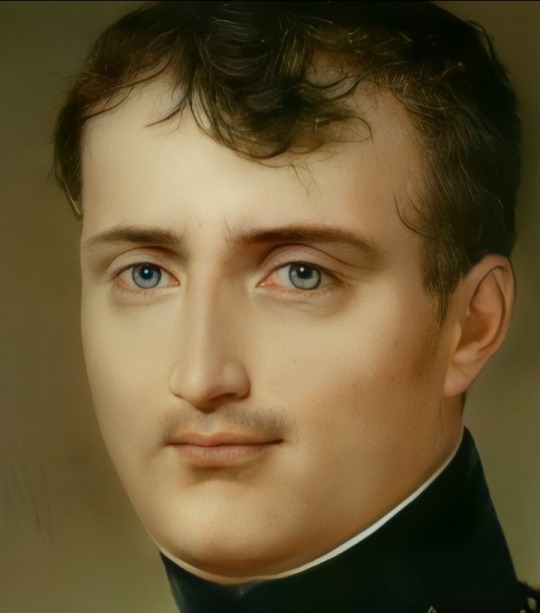
Only when he had gone did I take the glass from my lips, but kept it in my hand. Félicité had seen everything! She looked at me questioningly, but said nothing. Élisabeth had seen it too. When the Empress was distracted by Madame de Rémusat and Madame de Luçay, Élisabeth approached me. She leaned towards me and hissed like a cat: "Don't get any ideas...the Emperor is only interested in me!"
A few days later Églée came to me as I was tuning the harp in the Empress's salon. "Félicité told me about the incident with Élisabeth. You have to be careful, Adèle!" Églée sat down next to me. She continued in a quiet voice. "You won't find any friends among the ladies-in-waiting. Especially not if the Emperor or Empress favors you! You'll arouse envy and resentment...you don't want that, do you!" I shook my head violently. "No. Certainly not!" - "Good! You really have to be careful of Élisabeth, she's very scheming. Besides....she's a whore." I looked at Églée in surprise. "Just because she's sleeping with the Emperor?" That was my only conclusion. "No, but she's only doing it for money...not for love! Rapp told me something...you won't believe it!" I bit my lower lip expectantly. I already knew the most important thing for me - that Élisabeth didn't love the Emperor! I was infinitely relieved! And, of course, excited to hear what would happen next. Églée told me, not without pleasure: "Élisabeth wrote a letter to the Emperor...she was in financial difficulties...her creditors had given her a deadline. If she could not raise 30,000 Francs within twenty-four hours she would end up in debtors' prison. She would rather kill herself than go to debtors' prison! The Emperor was shocked! He sent Rapp to her with the money. But when Rapp entered her salon, he saw to his great surprise that Madame de Vaudey had not fallen into despair, but was sitting happily with several gentlemen at the gaming table, enjoying champagne! Rapp immediately turned back with the money and reported to the Emperor. Napoléon was furious!"
I had never heard such an exciting story! It sounded like something out of a novel. "Has the Emperor ended his affair with Élisabeth?" Églée shook her head. "I asked General Rapp that too, but he said that she might still have a chance with the Emperor...he's very fond of her!" Églée sighed. "Perhaps he loves her! Who knows? But one thing's for sure...Élisabeth will try everything to get the Emperor back! She's so raffinée...she knows these tricks that make men submissive." I looked questioningly at Églée. "Tricks...what do you mean?" I really had no idea what she meant by that. "Oh, you little sheep!" said Églée. "Don't you know that some women do things that men don't get from their wives? It's always been that way. A man's mistress must control him through her tricks in the art of love-making; only then can she keep him and his money! And as for Élisabeth, I can only hope that this affair will soon be over and that our dear Empress will not find out the least bit about it!"
But some time later a scandal broke out at the court of Empress Joséphine! The morning began like any other day, with tea and brioches and only two important topics to discuss: the coronation and our needle-work for Hortense's second son, the little Prince Napoléon Louis, who was only a few weeks old. I was working on a white bonnet with rabbits and ducks on a colorful meadow of flowers. I liked it very much, so I eagerly embroidered it. Églée sewed a tiny hussar jacket, for which Félicité sewed the trousers. We were all happily at work, when Élisabeth, who was practicing a melody on the harp, suddenly got up and left the salon. It might not have been noticed if she had not left this sudden silence behind her. Églée nudged me and whispered: "Something is going on..." I looked over, the Empress was discussing something with Madame de Rémusat. Aunt Joséphine seemed agitated. She kept whispering to Madame de Rémusat, who tried to calm her down. She finally succeeded and the Empress looked again at the book she had been reading. There was silence for a while. Suddenly the Empress jumped up, threw the book on the floor and said loudly: "That's enough! I can't stand it anymore!" She walked quickly to the door, elegantly lifting her train. Madame de Rémusat also jumped up and ran after her. "Your Majesty...please stay calm...I beg you!" She sounded desperate. All we saw was the rustling of the robes disappearing through the doorway. Silence remained. None of the ladies dared to say a word. Only Églée grinned. "I told you...this is the most exciting place in the world and I don't want to be anywhere else!" She continued sewing, still grinning. Old Madame de Chevreuse had fallen asleep, only Madame de La Rochefoucauld whispered eagerly with Madame de Soustras. These ladies came from the Ancien Regime, they came directly from the court of Marie Antoinette and were accordingly blasé. They wanted nothing to do with us young court ladies of the lower nobility or Bourgeoisie. Églée called them disparagingly "the old powder puffs!" The little gold clock on the mantelpiece tinkled, perhaps ten minutes had passed when suddenly the door was thrown open and the Empress entered. Her face was streaming with tears. She ran to her dressing room and immediately disappeared behind the door. At the same moment the Emperor appeared in our salon. His face was contorted with anger and of snow-white colour, his hair was disheveled. He had clenched his hands into fists and shouted: "You will not run away, Madame!" We could not so quickly sink into a curtsy as the Emperor strode across the room and disappeared into Joséphine's dressing room. And then we heard the Emperor shouting at his wife: "I'm fed up with your spying! You have no right whatsoever to interfere in my affairs! If I want to fuck my whores after breakfast, then that's not of your business! Do you hear me!!! I fuck whoever and whenever I want!" Then there was silence for a moment and we heard the Empress crying. Églée bit her lips with a grin and looked at Madame de La Rochefoucauld, who was holding a handkerchief to her open mouth. She seemed close to fainting. Then the door opened. "I want a divorce, Madame! Pack your things, you are leaving the Tuileries today!" Now we managed to curtsy in time. But the Emperor walked straight past us and disappeared. We looked at each other helplessly, neither of us said anything. From the Empress's dressing room we heard her loud crying. Madame de Rémusat finally went to her and closed the door. Madame de Chevreuse was still asleep.
We never saw Élisabeth de Vaudey again!
3 notes
·
View notes
Text
I was gonna leave Electrified alone but fuck it, this seemed like fun.
So Electrified's third act was uh... we'll say 'not amazing.' Me personally, I didn't care too much, but I've always been told my tastes are questionable at best. In any case, I wanted to try my hand at rewriting this.
We start at the power plant turned salon. The lights are flickering and the Ghoul Squad are trying their best to keep the normies calm. Suddenly, a hand bursts out of the floor, followed by another, and another. In no time at all, Moanica and her zomboys have everybody surrounded. She looks around at the normies, terrified and screaming because of what's happening. Moanica smirks.
"Are you scared, normies? Well, you should be! Because monsters and zombies are real! And tonight, under the cover of perpetual darkness, me and my zomboys are going out into your world to show you what happens when you force us to hide in the shadows!
"It is time that you normies finally learn your place..."
She reaches towards the nearest human and gives them a slow scratch across the cheek. In seconds a new zombie joins Moanica's zomboys.
"Under me."
The zomboys attack, capturing humans so that Moanica can turn them and repeat the cycle. The Ghoul Squad tries to protect the normies, but Moanica opens trap doors under them all and sends them down to her lair.
Down below, Frankie isn't doing too hot. They're (I'm sorry, I know G1 and G2 use she/her but I'm too used to G3 Frankie) glowing like a radioactive Lite Brite and their eyes are shining like high beams. They try to move, but they can barely lift their arms.
"So...much...electricity..."
Znap flies over to its creator, unsure of how to help, when a bolt of electricity shoots out from one of Frankie's... well, bolts and hits Znap. The little electricity being begins absorbing some of Frankie's excess power. Not enough to overload or hurt itself, but enough so that Frankie can at least move. Maybe Twyla gets hit with a little and gets her Electrified design, idk.
Now that Frankie's a little better, the ghouls explain what happen, and they all set out to Normie Town to stop Moanica.
When they get there, it looks like something out of a zombie movie. Zombies new and old shuffle through the cul-de-sac, looking for humans to bring to their leader. None of the ghouls know what to do, but Frankie has an idea. Or at least a part of one.
The zombies are essentially reanimated corpses, right? And Frankie was brough to life with it, so maybe, just maybe they can restart the zombies hearts with a little power.
(Look, it's a stretch and I doubt G2 would have brought up stopped hearts or reanimation, but it's the best I got)
Lagoona, Ari, and Twyla distract Moanica while Frankie, Cleo, Draculaura, and Clawdeen begin rounding up all of the zombies. Once they're sure everybody is there, Frankie warns there friends to hit the dirt, then unleashes enough of their electricity to hit all of the zombies.
When the sparks die down, the ghouls are pleased to see that the humans are all back to normal. Even the zomboys Moanica already had are back to their old selves. Of course, there's a chance they'll all turn back, but that's a problem for another day.
Moanica, alone and defeated, runs for the hills, promising to come back another day. Frankie takes a deep breath and releases the rest of their electricity. With the power restored and the zombies defeated, the Ghoul Squad heads home before the normies begin looking for someone to blame.
A few days later, the ghouls are cleaning the salon and listening to a normie radio reporting what happened. Everybody is worried that this might mean the end of Monster High, or worse, another Great Fright Flight. Draculaura tries to be optimistic, but even she's worried about the future.
Clawdeen laments the loss of her dream, only for Twyla to come bursting in with a group of humans, one smaller than the crowd seen in the actual movie. They saw the Ghoul Squad fighting to rescue them and figured that maybe not every monster is like Moanica. It'll probably be a long time before the normies are okay around monsters, but this is a good start.
From there, it would probably lead into a third movie, likely taking place after Adventures of the Ghoul Squad, though the only thing I can think of is Ghouls Rule without the normies nearly executing somebody. Maybe there would be a different antagonist? Just to give Moanica a break? idk
#monster high#monster high g2#moanica d'kay#frankie stein#long post#i'm gonna be real i ripped the first half of moanica's speech straight from the movie#everything up to 'me and my zomboys are going out into *your* world to-'#hot take but i like the electrified designs#twyla's big ass bow is super cute and i love cleo's hair#they're so dumb but in a good way#honestly there's a fair bit from g2 that i'd like to rewrite#like clawdeen's family living in a cave and her having twelve (fifteen if we're counting toy only) siblings#cos what the actual fuck was that??#for real my biggest issue with g2
2 notes
·
View notes
Text
Best Salon in Yamunanagar: A Guide to Top Beauty and Grooming Services
Best salon in Yamunanagar can be a game-changer when it comes to transforming your look and boosting your confidence. Whether you're looking for a trendy haircut, a rejuvenating facial, or a full-on makeover, a great salon can offer you the best of beauty and relaxation. Yamunanagar, a bustling city in Haryana, has seen a surge in modern beauty salons that cater to the diverse grooming needs of its residents. In this guide, we’ll explore some of the best salons in the city and what makes them stand out.
What Makes Mahak’s Makeover Luxury Family Salon the Best Salon in Yamunanagar?
The best salon in Yamunanagar Mahak’s Makeover Luxury Family Salon ,offers more than just beauty treatments. It provides an experience. From top-quality products to expert stylists, comfortable ambiance, and exceptional customer service, the best salons in the city combine these elements to make every visit special.

Key Services Offered at the Best Salons in Yamunanagar
Haircuts and Hairstyling The best salons in Yamunanagar boast skilled stylists who are up-to-date with the latest trends and techniques. Whether you're looking for a classic haircut, bold new color, or a sophisticated updo for an event, these salons offer personalized services that match your style and preferences.
Facials and Skin Care Beautiful skin starts with professional care. The best salons in Yamunanagar offer a range of skin treatments, from classic facials to advanced anti-aging and acne treatments. These salons use high-quality skincare products and techniques to give you glowing, healthy skin.
Nail Care and Nail Art The trend of intricate nail art and detailed manicures and pedicures has gained popularity, and the best salons in Yamunanagar have embraced it. You’ll find everything from basic mani-pedis to elaborate designs that turn your nails into a canvas.
Bridal and Special Occasion Services For brides-to-be and others celebrating special occasions, the best salons in Yamunanagar offer tailored bridal packages that include hair, makeup, and skin services. These packages ensure you look flawless on your big day.
Men’s Grooming While many salons are often associated with women's beauty, the best salons in Yamunanagar are also well-equipped to cater to men’s grooming needs.
What Sets the Best Salon in Yamunanagar Apart?
Experienced and Skilled Professionals The best salon in Yamunanagar are staffed with certified, experienced professionals who are experts in their fields.. Whether you want a trendy hairstyle, a skin rejuvenation treatment, or a special makeup look, these professionals ensure that you receive the best quality service.
State-of-the-Art Equipment and Products The top salon in Yamunanagar pride themselves on using the latest tools and high-end beauty products. Their products are chosen carefully to provide the best results for different skin types and hair textures.
Hygiene and Cleanliness Hygiene is crucial when it comes to salons, and the best salons in Yamunanagar maintain the highest standards of cleanliness and sanitation. This ensures a safe and comfortable experience for every client.
Relaxing Ambience The best salons in Yamunanagar understand that a trip to the salon is not just about beauty—it’s about unwinding and relaxing.Soft lighting, soothing music, and comfortable seating create an environment where you can de-stress and enjoy your time.
Customer-Centric Approach What truly sets the best salons apart is their focus on customer satisfaction. Whether you're unsure about which haircut would suit your face shape or what facial will work best for your skin, these salons provide expert advice that helps you make informed decisions.
When it comes to grooming and beauty, the best salon in Yamunanagar can make all the difference in how you look and feel. With experienced professionals, state-of-the-art equipment, top-tier products, and a focus on hygiene and customer satisfaction, these salons offer services that cater to a wide range of beauty needs.
Mahak's Makeover Luxury Family Salon: A Premier Destination for Beauty and Relaxation
Mahak's Makeover Luxury Family Salon is one of the most sought-after beauty destinations in the city, offering a blend of sophistication, luxury, and exceptional service for the entire family. With a strong focus on providing high-quality beauty treatments, Mahak’s Makeover is committed to ensuring that every client feels pampered, relaxed, and rejuvenated.
Whether you're looking for a stylish haircut, a rejuvenating facial, or a glamorous makeup look, Mahak's Makeover Luxury Family Salon offers it all. The salon is known for its expert hairstylists, makeup artists, and skincare professionals who are skilled at tailoring services to meet individual needs.
The ambiance at Mahak's Makeover exudes elegance and comfort. The contemporary interior, combined with soothing music and soft lighting, creates a calm and welcoming environment where clients can unwind. Every treatment is carried out using premium products, ensuring both the safety and satisfaction of every guest.
What truly sets Mahak's Makeover apart is its family-friendly approach. The salon offers specialized services for men, women, and children, making it an ideal place for family grooming sessions. Whether it’s a haircut for the kids or a rejuvenating spa treatment for the adults, the staff at Mahak's Makeover ensures that every member of the family receives personalized attention and top-notch service.
With a strong reputation for quality, luxury, and customer care, Mahak's Makeover Luxury Family Salon is the perfect choice for anyone looking to indulge in the finest beauty treatments in a relaxing, family-oriented atmosphere.
For More details :- https://maps.app.goo.gl/m5wsyat9aLa3ynQh6
0 notes
Text
Pablo Picasso was the most dominant and influential artist of the 1st half of the 20th century. Associated most of all with pioneering Cubism, he also invented collage and made major contribution to Surrealism. He saw himself above all as a painter, yet his sculpture was greatly influential, and he also explored areas as diverse as printmaking and ceramics. Finally, he was a famously charismatic personality, the leading figure in the Ecole de Paris. His many relationships with women not only filtered into his art but also may have directed its course, and his behavior has come to embody that of the bohemian modern artist in the popular imagination.
Picasso rejected Matisse's view of the primary importance and role of colour, and focused instead on new pictorial ways of representing form and space. Influenced by novelties of Cézanne, and also by African sculpture and ancient Iberian art, he started to lend his figures more structure, and to deconstruct the conventions of perspective that had dominated painting since the Renaissance. This led him (alongside with Georges Braque) to evolve an entirely new Cubist movement, which rapidly became the cutting edge of modern art. At the same time, Picasso himself rejected the label "Cubism," especially when critics began to differentiate between the two key approaches he pursued - Analytic and Synthetic.
In the 1920s and 1930s Picasso adopted a neoclassical figurative style. As he matured he worked on his own versions of canonical masterpieces by artists such as Poussin, Ingres, Velazquez, Goya, Rembrandt, and El Greco.
Picasso's influence was profound and far-reaching for most of his life. His work in pioneering Cubism established a set of pictorial problems, devices, and approaches, which remained important well into the 1950s. The Museum of Modern Art in New York (MoMA) has been called "the house that Pablo built," because it has so widely exhibited the artist's work. Picasso created some of the greatest 20th century paintings, several of which have achieved iconic status (Les Demoiselles d'Avignon, Guernica, Weeping Woman).
Picasso moved to Paris in 1904 and settled in the artist quarter Bateau-Lavoir, where he lived among bohemian poets and writers such as Guillaume Apollinaire (1880–1918) and Max Jacob (1876–1944). In At the Lapin Agile (1992.391) from 1905, Picasso directed his attention toward more pleasant themes such as carnival performers, harlequins, and clowns. In this painting, he used his own image for the harlequin figure and abandoned the daunting blues in favor of vivid hues, red for example, to celebrate the lives of circus performers (categorically labeled his Rose Period). In Paris, he found dedicated patrons in American siblings Gertrude (1874–1946) and Leo (1872–1947) Stein, whose Saturday-evening salons in their home at 27, rue des Fleurus was an incubator for modern artistic and intellectual thought. At the Steins he met other artists living and working in the city—generally referred to as the School of Paris—such as Henri Matisse (1869–1954). Painted in 1905–6, Gertrude Stein (47.106) records Picasso’s new fascination with pre-Roman Iberian sculpture and African and Oceanic art. Concentrating on intuition rather than strict observation, and unsatisfied with the features of Stein’s face, Picasso reworked her image into a masklike manifestation stimulated by primitivism. The influence of African and Oceanic art is explicit in his masterpiece Les Demoiselles d’Avignon (1907; Museum of Modern Art, New York), a painting that signals the nascent stages of Cubism. Here the figure arrangement recalls Cézanne’s compositions of bathers, while stylistically it is influenced by primitivism, evident by the angular planes and well-defined contours that create an overall sculptural solidity in the figures.
0 notes
Text
Day 71 The first G!
I convinced Rose to come walking into Lekeitio from the hotel. It was a pleasant experience wondering around the sleepy village. I even made a purchase, two more pairs of earrings! Having harassed the hotel receptionist (a young woman from Paraguay) about wine tasting the night before and spent ages trying to find us an option; between her, the owners and myself, we got nothing that was on our route, and the perfect options was booked out! Her recommended Pasteleria was also closed on Mondays.
So first stop to break up the trip, a coffee roaster, BB Cafe, in an industrial area of Abadiño. I'm sure we would have been their first Australian clients. The coffee was fabulous at €3.60 for two small lattes, and was enjoyed alongside the smell of the roasting process. I was tempted to buy beans, but thought twice given my luggage challenges.
Next stop Bilbao to view the first G! I couldn't get any parking outside the lunch spot I booked, but scored a great spot near the Museum, on street paid parking. The 16 minute walk back to the lunch spot and the lunch itself would have been time better spent elsewhere. I found this cafe, El Salon de mi casa, that I thought might be novel. I should have read the fine print, it was quite a bizarre experience. We had to buzz first. A stern woman told us to take off our shoes, hand sanitise and watch a four minute video in english before gaining access. We then entered the interior. There were two others inside, who left shortly after we arrived. From what I could ascertain, there were seven rescue cats roaming around the restaurant and tables. Luckily the place didn't smell. I think the main purpose is to check out the cats for potential adoption.
We were presented with a set menu and told this was our option, despite there being an a la carte menu, but if we wanted anything off the a la carte menu it had to total €14.95, the same price as the set menu. We settled on the set menu and kept hearing the microwave! The volunteer (I think sister of the owner) insisted the pumpkin soup was not soup, it wasn't a dip either, it was puree! The tomato and mozzarella on the slightly dry bread turned out ok. My chicken and chips was very ordinary. And despite me suggesting to Rose that the croque madam might not be a great option, as she'd already had two eggs for breakfast, she went with that anyway, and just ate the ham out of the sandwich, as it was also covered in grilled cheese that she didn't like. Not sure what you call that version! When it came time for dessert I asked if we could take it away, that was not possible, no containers. The flan was no longer available but we could have one only of the homemade yoghurt, a mandarin or a milkshake! I had the very tart homemade yoghurt. There was then some negotiation required about the price. I had booked via The Fork app which offered 30% off the a la carte menu, but we weren't offered this menu. I was really not happy to pay €30 for microwaved, low quality food. The woman rang her sister about The Fork deal. The phone was then handed to me. In turned out I knew more about The Fork than the business. We then had a lengthy conversation on the phone as they really wanted my feedback and there was "pressure" for me not to post a bad review. No wonder they had a rating of 9.6! I was refunded what I'd already paid and left a donation instead and paid for Rose's socks that she had to buy to wear!
Now after all that craziness, to the real reason for going into Bilbao, the Guggenheim Museum, spectacular building. Maybe there'll be a next time to visit the interior. It was another lovely wonder, around the building and back to the car.
We then headed the rest of the distance to Santander. After our lunch experience we both wanted salad for dinner, courtesy of the two supermarkets we could drive into near our hotel. My hips and shoulder had been giving me grief driving so I went for a one hour walk along the coastline.
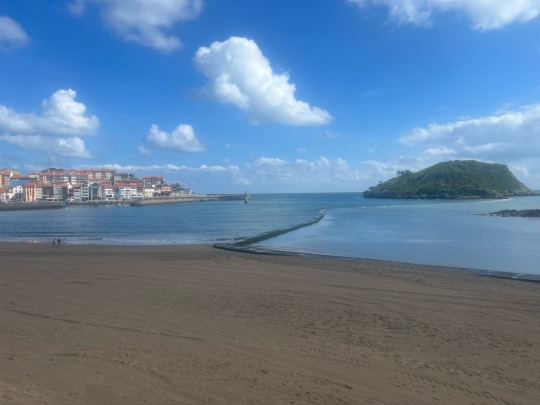
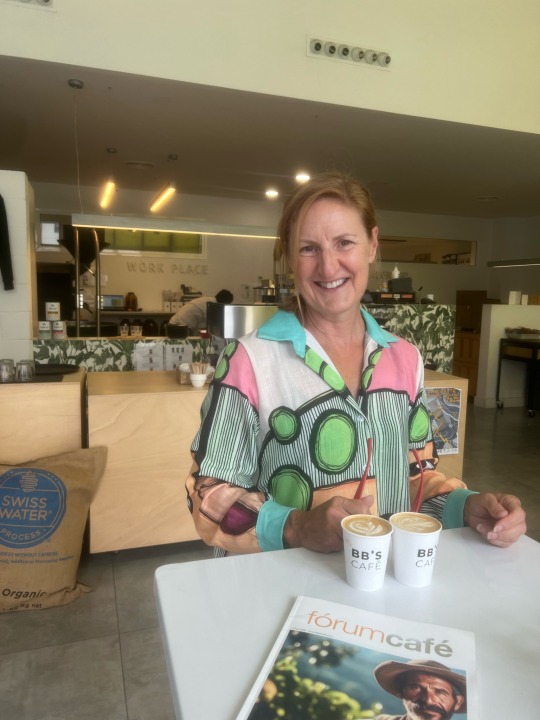
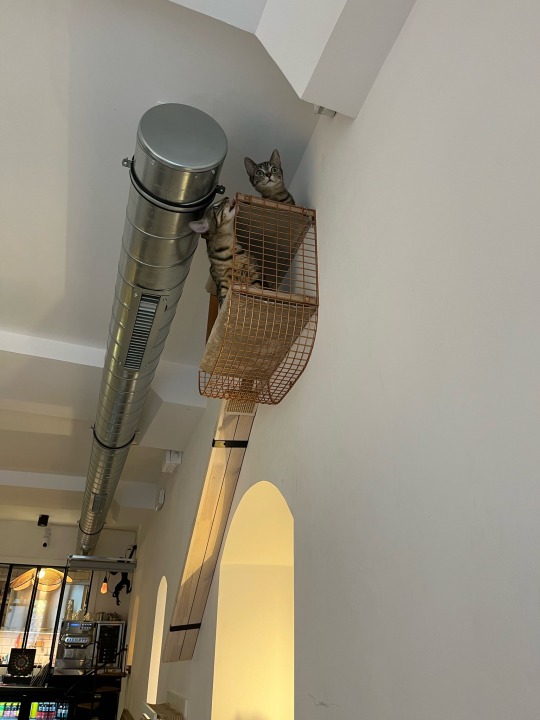
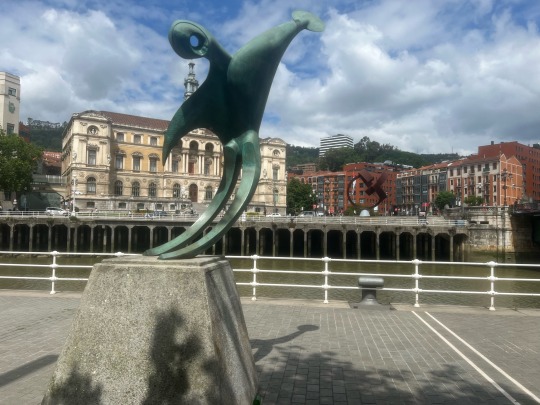
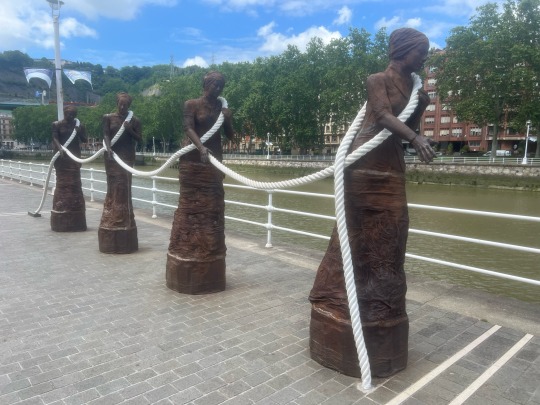
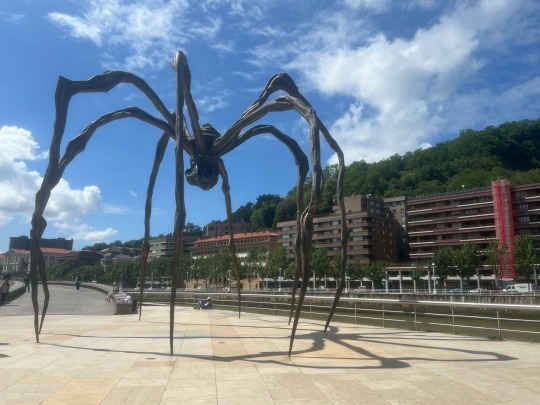
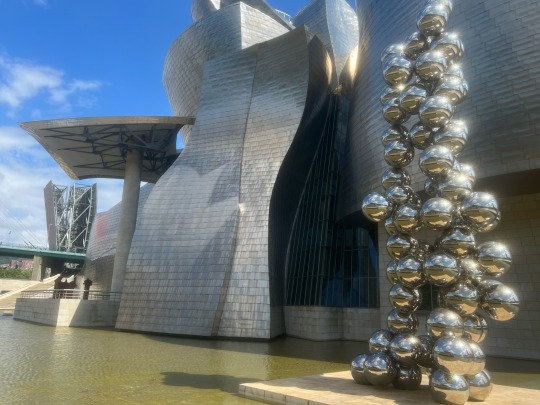
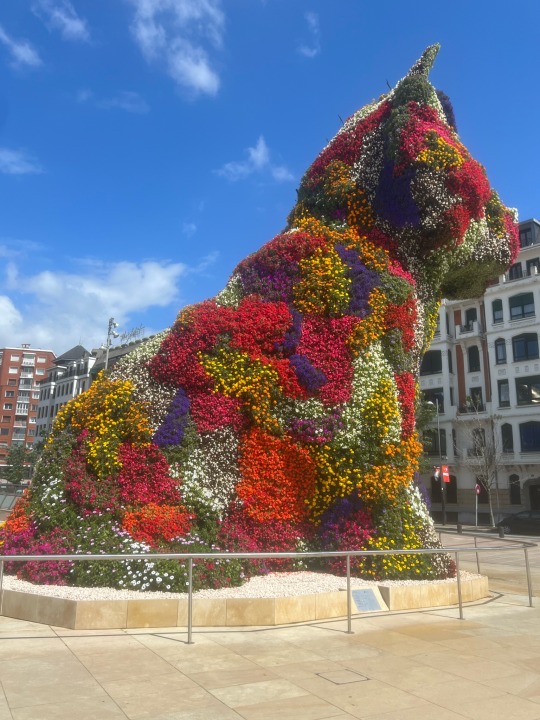
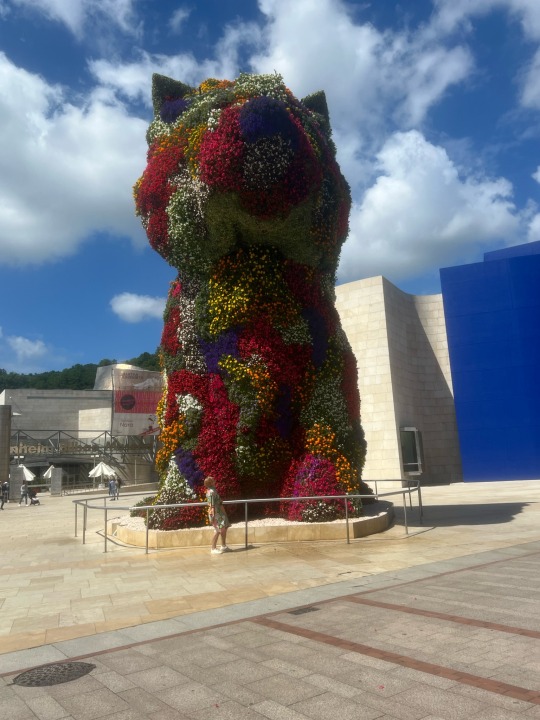
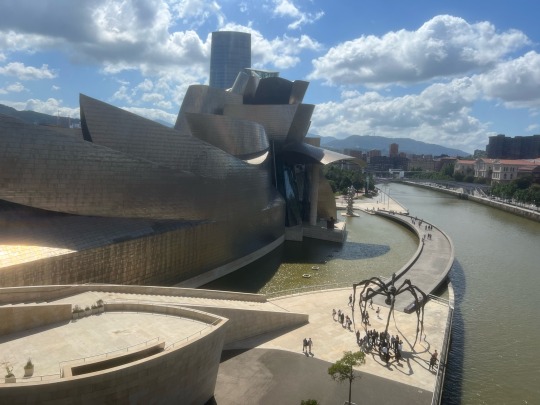
0 notes
Text
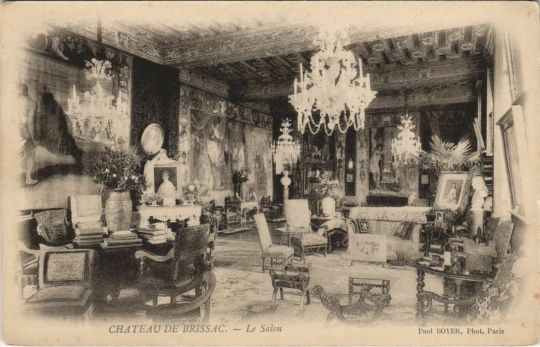
Salon of the 15th-century Château de Brissac, Anjou region of western France
French vintage postcard
#vintage#château de brissac#salon#photography#postkarte#western#french#carte postale#de#postal#region#th#briefkaart#france#postcard#anjou#old#15th-century#photo#ansichtskarte#sepia#chteau#brissac#postkaart#ephemera#century#tarjeta#historic
8 notes
·
View notes
Text
A LOUER S+2 - LA MARSA - TEL 53672333 - FB.5927
Loyer mensuel : 1400DT Superficie : 220 m² Type : S+2 Adresse : LA MARSA Contacter notre conseiller en immobilier au 53672333 / 56096179 / 70727279 A louer un appartement s+2 la marsa cite el Khalil. Il compose d’un grand salon, 2 chambres, 2 salles de bain, grande cuisine terrasse vue sur la forêt de gamma th chauffage central. Salon climatisé, cuisine toute équipée, réfrigérateur, machine à…
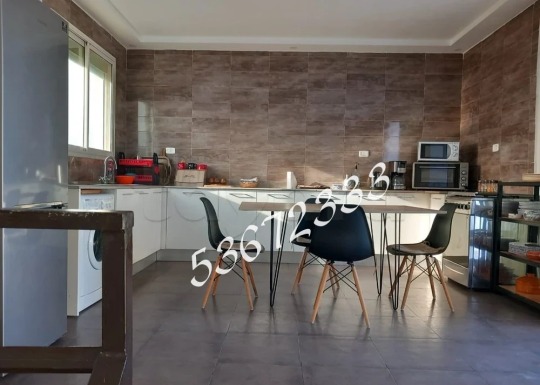
View On WordPress
0 notes
Text
[fic] Bilateral Agreement
Bilateral Agreement
Who Made Me a Princess | Lucas x Athanasia de Alger Obelia | T | 3.5k words ao3 link
There’s a foreign prince visiting Obelia, and Lucas doesn’t like him one bit.
Also, there’s a threat of assassination, but that’s not at all important.
A/N: Wrote this on a whim, in a caffeine-induced fugue state. It's been a while since I've read the entire webcomic so there may be lapses in canon details. I just read the last 10 chapters as a refresher. Anyway, this is not a serious fic. Takes place post-canon. Athy is 19 here. Not beta'd. Hope you enjoy!
His name is Valerio Giovanni Loredan and he’s the second prince of an island kingdom far, far away – so far that Lucas bothers recalling neither its name nor its coordinates from the map. He’s tall and tan with chocolate brown hair, a perpetual smile plastered on his face that indicates a good-natured personality. He seems to be the sort of fellow who doesn’t get offended even if you insult him and his royal lineage.
Valerio is presenting himself before the Emperor and the Crown Princess, his envoys falling in line behind him. He’s dressed in loose clothing, coat draped like a robe and jewelry covering his neck, arms, and even ankles. From an outsider’s perspective he looks as if he’s insulting the Obelian court with his fashion of choice, but compared with the Emperor on his regular days Valerio’s clothes seem like they belong in the winter collection.
“I am deeply honored and grateful for the kindness and hospitality the Obelian Empire is giving us,” Valerio is saying. “I am looking forward to our stay here in your beautiful country.”
Claude nods and says nothing, while Athanasia smiles and descends from her seat, offering a hand for Valerio to shake.
The prince blinks and – to Lucas’s nascent horror – his cheeks begin to darken.
He has a bad feeling about this.
+
“How long is that prince staying?”
They’re at the salon in the Emerald Palace, the afternoon sun filtering its way through the windows, casting the room a warm, yellow glow. A day after Valerio and his diplomatic mission’s arrival, Lucas appeared in Athanasia’s room to pester her into having tea with him. Athanasia relented after five minutes of needling, and Lucas bit a smirk at the successful thwarting of any appointment she had in the day.
Athanasia pauses in her sip. “Who? Valerio?”
At the mention of the prince’s first name, Lucas frowns.
“You’re already first-name basis with him?”
Lucas has to do a double-take when a faint red tints Athanasia’s cheeks. Something hot and tight builds within Lucas’s chest, and not the good kind. He exhales more harshly than usual, and Athanasia notices.
“What? I mean I have to be friendly to him, you know? In Cornaro, hierarchy doesn’t mean much, so using honorifics is more a rare occurrence than calling people by their first names.”
“Cornaro?”
She looks at him funny. “It’s the name of his kingdom. Were you not paying attention?”
He huffs. “Why should I bother learning the name of his kingdom? It’s unimportant to me.”
He feels her shoot him a piercing glare, and he returns the gesture with an equal level of insouciance.
“In any case, I don’t want you being rude to him and his envoy. You’re the Imperial Magician, which means you’re part of the Obelian Court. Anything you do reflects the imperial family, which means me and Dad.”
She doesn’t have to tell him that. Lucas knows his role in the royal court. Ever since Athanasia’s official appointment as the Crown Princess, Lucas finds himself assisting her in a number of matters, mostly on travel logistics and procurement of materials for her projects. Sometimes, he takes up the task of bodyguarding her despite the Crimson Blood Knight’s presence, which makes the Emperor knot his forehead and cast him murderous looks.
“Tch. I know, I know.” He placates, “I swear not to replace all his things with dust balls.”
Athanasia seems skeptical of that, but the matter is dropped and they enjoy the pastries for the rest of the hour.
+
On the third day, Athanasia gives Valerio a tour of the rose gardens. It’s late spring, so plenty of flowers are in full bloom, painting the place in bright, colorful hues. Athanasia wears a floral dress that matches the background, her jewel eyes standing out more than usual. She looks like a garden fairy dancing among the roses.
Valerio, from where Lucas sourly watches the pair, is two heads taller than the princess. He nods along whatever Athanasia is saying, her hands in an energetic gesticulation that Lucas assumes to be an explanation of how the garden was developed. Valerio doesn’t interrupt her, nods every now and then, and talks only when he’s asked a question. He throws a comment that Athanasia laughs at, delighted, and Lucas feels his brows melting together.
Beside him Ijekiel raises his eyebrows. It’s one of his visits to the Emerald Palace, disguised as an official meeting with the Crown Princess. He and Athanasia would talk in an official capacity for an hour before they shed their public roles and have tea together in an unofficial capacity. On most occasions, Lucas would crash their teatime, to Ijekiel’s consternation. But the worst thing he does is flatten his lips and frown maturely.
“I’m seeing what you mean,” Ijekiel says. If you ask Lucas, he’d say that they’re not friends, but in the years following the coronation they’ve developed a sort of grudging acceptance of each other, an acknowledgment of their places in Athanasia’s life and the extent of where that would lead to (they still remember vividly Athanasia’s loud declaration of not needing to get married). In this limbo, they have since learned to respect each other’s capabilities.
“It pisses me off,” Lucas grumbles. In the distance the tour continues on merrily. Seconds later Athanasia trips on a bramble, but Valerio is quick to hold on to her arm, thus preventing her from falling to the ground. In that moment, Valerio seems to be sparkling in his heroic deed, his hair and his coat fluttering in the non-existent breeze. Lucas finds himself nearly teleporting to them, but seeing as the princess is already fine, he leans back from where he stands, Athanasia’s warning not to interfere clear in his mind. “Really pisses me off,” he repeats.
Ijekiel hums in agreement.
+
It’s on the fifth day that things get exciting.
The palace explodes with the news of an assassination threat targeting the Cornaran prince, who receives the news with a bafflingly apologetic humor. Logically, this development can potentially strain the budding relations between Obelia and Cornaro, because any opposition to their alliance can treat this as an opportunity to smear either kingdoms. One can accuse Obelia of orchestrating an assassination attempt; conversely, one can speculate that Cornaro may have set this up to pin the blame on Obelia.
“But why would we do this?” Athanasia says, her lips pulled into a frown. “What would Obelia gain from it? It doesn’t make any sense.”
“It doesn’t have to make sense,” Lucas replies, swiping a grape from the tray that Athanasia’s lady-in-waiting delivered. He pinches it twice before putting it in his mouth. “Those who hate Obelia or Cornaro would believe that nonsense, regardless of whether it’s true or not.” He pauses as a thought occurs to him. “Where’s your father in all this? I notice that it’s you who keeps entertaining the delegation.”
“Dad? Oh, he actually assigned this to me. It’s my first diplomatic responsibility, now that I think about it.”
“He what.”
He’s plucked another grape as Athanasia was talking, and when she mentions being in charge of the foreign relations, Lucas summarily drops the grape and it bounces off the couch and into the carpeted floor.
Athanasia glances at the grape and points at it. “Pick that up.”
Lucas ignores her. “Why would he assign that to you? Is that why you keep hanging out with that foreign brat?”
“Excuse me – brat? Valerio is a perfectly nice man! He’s very polite and he laughs at my jokes.”
“That’s it? All it takes is a laugh here and there and you’re all smitten?”
“What are you talking about?” Athanasia glares at him before sliding her gaze away and muttering, “You don’t laugh at my jokes.”
“That’s because they’re not funny.”
“Ugh! This is why Valerio’s one hundred times nicer than you.”
That rubs Lucas the wrong way, the heaviness inside his ribs doubling, red-heat in its tightness. He doesn’t realize that he’s gritting his teeth until Athanasia sends him an unimpressed look, already used to his personality. That just angers Lucas further, and he springs up from the couch, grumbles a Tch, whatever, and teleports away.
It’s an hour after he left that he remembers he never picked up the grape.
+
Normally Lucas would be helping Athanasia in her tasks as important as diplomacy, but the recent events prevent him from lending a hand. He skips going to the palace for a couple of days and stays at the Black Tower instead, causing a panicked uproar among the magicians.
By the fourteenth consultation, Lucas decides he can no longer endure their stupidity and jumps back to the Imperial Palace, leaving a magician’s apprentice hanging.
He’s welcomed by none other than Valerio, who’s currently exploring the flora near the lake. Recognizing Lucas, Valerio grins and waves at him, approaching him with guilelessness borne out of ignorance of the knowledge that Lucas had badmouthed him twice already.
“Imperial Magician!” he greets, like he’s not the target of assassination. Lucas has half a mind to teleport away, diplomacy be damned. “It’s an honor running into you today.”
There’s a snarky reply ready on his tongue, but he hesitates at Valerio’s genuine joy at seeing him.
“Your highness,” he allows, nodding at the prince.
Valerio takes that as a sign to launch into an enthusiastic speech about how he’s enjoying his stay in Obelia so far – threats of assassination notwithstanding – how he’s appreciative of the kindness the people here provide him and his delegation, and how he’s learning so much of their culture.
“Living in a landlocked country truly is different from living on an island. I have traveled to so many countries but I never tire of experiencing new cultures. Obelia is a beautiful place that offers so many things, and with such prosperous economy! I hope to secure as many trade agreements as I can before I leave.”
Were Lucas a courteous man he would have complimented Valerio on his aspirations; unfortunately, he’s not, so what he says is, “That is, if you’re still alive by then.”
If Athanasia were present, she would have smacked Lucas by the arm and shouted at him for being so mean. But it’s just him and Valerio, and Valerio’s so blindsided by that comment that he gapes at Lucas for exactly ten seconds before expiring a shocked laughter that evolves into a full-blown cackle that startles Lucas.
“There is no need to worry,” he says after mellowing with a chuckle. “I have not survived the seas being naive and defenseless. Besides, Crown Princess Athanasia is helping me untangle this situation.”
He begins to relate to Lucas his first brush of danger in the middle of the sea. It was storming at the time, powerful winds that whipped at Valerio’s ship, waves almost swallowing it whole. Almost half of his crew attempted to mutiny during those harrowing hours, and Lucas thinks to himself as he listens to the tale, this can be easily dealt with using magic. But Valerio possesses no mana, and only his sincere words and his unconventional problem-solving skills saved him from both the storm and the rebellion.
Valerio’s animated the entire time he’s telling the story, and his eyes catch the lake’s shimmer, making them brighter and him more riveting. Lucas is almost impressed. Almost.
He kind of sees now why many people are so taken with him, Athanasia included. But no matter what happens Lucas will never ever join that camp.
+
“Fine,” Lucas declares later that night, a beat after popping up in the middle of Athanasia’s office, surprising the princess that she curses and drops the stack of documents she’s holding.
Lucas raises his eyebrows. “If your father hears that, you’ll be in trouble.”
“Shut up,” she says, fingers rubbing her temple. Based on the flurry of papers, it seems that Athanasia’s juggling more than seven tasks at the same time. This is on top of the thing with Valerio. “Why are you here? Are you done sulking?”
He ignores that last jab. “I will help you with the investigation of the Cornaran prince’s assassination threat.”
Athanasia’s fingers stop moving and she raises her head with an expression that clearly indicates she never expected Lucas to utter those words.
“Oh,” she says, tone very much astonished. A moment later her face morphs into something smug – an expression Lucas never expected – his expectation falls somewhere between her beaming at him in appreciation and her thanking him for his extensive generosity.
There’s a small part of him that laments this development between them. Athanasia, at nineteen, has gone through so much that her heart grew sturdy and defiant, and this means that she’s even more comfortable with snarking at Lucas, who never has the patience for people’s impudence. But Athanasia is not just any people; she’s Athanasia, the one who has lived thrice, whose tremendous mana bent spacetime just to grant her desire for love, who faced her ordeals with the steel-strength conviction of someone who has everything to lose and thus has no plans of giving them up.
Athanasia, whose smile is a rose in full bloom, lush and free.
Lucas is not a magnanimous man; he’d rather destroy than cultivate. But for Athanasia he’d temper himself – something he’s never done in a long time.
+
With Lucas offering his assistance, the investigation wraps up sooner than anticipated. Turns out, a small anti-emperor faction is responsible for the threat; they thought that by putting the Cornaran prince in danger, they could frame Claude, and to an extent Athanasia, for it, thus a breakdown of both diplomatic and public relations.
Claude concludes the investigation by putting the anti-emperor faction in prison, where they will wait for their punishment. Lucas guesses that Claude’s all for execution, but Athanasia would probably oppose that and would suggest a more reasonable sentence.
“I am again grateful for the Emperor and the Imperial Crown Princess’s help and kindness amidst this extraordinary circumstance,” Valerio says, the imperial court his witness. He’s standing in full regalia – coat and jewelry and all – and the confidence in his tone and gait captivates yet again the people present.
“You’re welcome, Prince Valerio,” Athanasia replies, friendly smile on her face. “We only hope that this strengthens the relationship between our countries.”
“Of course, Your Imperial Highness.” There’s a pause where Valerio seems to be mustering something, and the shift of his legs alerts Lucas to an inexplicable dread that freezes his limbs. He braces for impact when Valerio says, “If I may be completely honest: Princess Athanasia has displayed such admirable qualities during our stay. She is wise, compassionate, and strong-willed that I find myself inevitably drawn to her. I realize that I have fallen in love with her. And with this I would like to submit myself and ask for her hand in marriage.”
He finishes his speech by kneeling in front of Athanasia and taking her hand, staring up at her with an earnestness that Lucas finds nauseating. There’s a hush that falls upon the court, all wide-eyed and disbelieving nobles unable to avert their gazes at the two figures in the middle of the hall. Across Lucas, Ijekiel observes the scene unfolding, fists and jaw clenched.
For a few moments, the world seems to be suspended in time, drained of color, monochromatic. But slowly, gradually, it returns: the tick of the clock resumes, hues bleed back into the scene, and Claude, who’s perched on his throne, casting his imperial gaze upon the spiraling event, blinks once, twice.
Then he rises from his seat.
The palace descends into chaos.
+
Athanasia watches the Cornaran convoy depart from the Imperial Palace, their carriages eventually disappearing from her line of sight through the office window. After Valerio’s confession, Claude attempted to murder the prince, which was hilarious (to Lucas) because it was the very thing that they had investigated and had wanted to prevent from happening.
Fortunately, Athanasia had managed to convince her father of the disadvantages of homicide, after which she – kindly, gently – turned down the prince’s proposal. Valerio accepted the rejection with good grace and humor, and swore to continue friendly diplomatic relations despite failing in the romantic aspect. This display of political sportsmanship only cemented his good standing among Obelian nobles, some of whom even invited him to various extracurricular activities. Within minutes Valerio had become a popular figure among the court, and Lucas had a dreadful inkling that he’ll see the Cornaran prince more in the future.
Lounging in the settee, Lucas smirks at Athanasia as she makes her way back to her desk, which is still avalanched by piles of documents. She stares at the papers ruefully before she sighs, and moves towards Lucas instead.
“The brat’s finally gone,” he says.
She sits in the settee, at the other end of it, and closes her eyes, slumps like a puppet with all its strings cut.
“Still a brat? You met him.”
Lucas pretends to think about it. “Okay, maybe not a brat,” he concedes. “A big puppy, more like.”
Athanasia hums.
It’s obvious that the past days exhausted her, one responsibility overtaking a number of others, and Athanasia still has to deal with them all within a given timeframe. Anyone would drop dead from the workload.
But Athanasia has been doing this for years. Starting early as training thanks to her father, Athanasia has built up stamina for this kind of work. It also helps that she’s smart and quick-witted, that she takes these tasks seriously. That she takes her third life seriously, but with a love that glows and brightens everything she touches.
Lucas shifts from his seat so he’s now leaning towards her. “You did well,” he says.
One eye opens, zeroing in on him. A corner of her mouth twitches.
“Yeah?” A thoughtful pause. “Thanks for assisting us with the investigation. You really helped a lot.”
Lucas feels his eyes narrowing, his lips curving upward. An idea forms in his head and he’s going to execute it.
“Of course,” he says with a tone that brooks no argument. “I deserve a reward, don’t I?”
This time, both eyes open, and Athanasia stares at him as if she can’t believe what she’s hearing.
“What?”
“You know what I want.”
The line of her mouth contorts in such a ridiculous way that Lucas has to bite a laugh lest she takes offense. But he sees the red blooming on Athanasia’s neck, cheeks, and even ears – like a blossoming rosebud – that a heat of his own burgeons inside his chest and spreads throughout his body, makes a home on his cheeks. It doesn’t deter him from what he plans to do, so he smirks again and closes his eyes.
“Come on, I’m waiting.”
It’s quiet for a while, the loudest he can hear is his own breathing. But then there’s a rustling of fabric, and a body heat not his gets closer.
He waits. And waits and waits until there’s a soft press of lips on his. Lucas locks himself in place, frozen and unable to move due to shock anyway. In all actuality, he expects a kiss only on the cheek. It’s been that way before. But now, this – this –
They don’t move for many moments. Lucas tries a peek, and a set of jewel eyes welcomes his sight.
Athanasia snatches herself away, sputtering and stuttering and so damned red in the face. She refuses to turn his way, body curling on itself because of the intense embarrassment.
No, he thinks to himself, and a hand grabs Athanasia’s shoulder, tight and intent on its grip. Athanasia goes rigid for one split second before she shudders.
“L-Lucas? W-What are you doing?”
His other hand cups her flushed cheek. This way she can no longer escape him. Lucas inches closer and closer until their noses almost touch and he peers at her and murmurs, “It’s not enough. You can do better than that.”
So their lips meet again, and this time Lucas moves with purpose. He catches Athanasia’s lower lip with his teeth and then licks it. Athanasia makes a sound that compels Lucas to prise her mouth open and thrust his tongue inside her, and it’s the hottest (and the only) kiss he’s ever had.
When they part, Lucas studies the dazed expression on Athanasia’s face. Her lips swollen and parted, eyes half-mast and unfocused, cheeks stained with crimson, hair slightly dishevelled. Her fingers cling onto his robes. Lucas shuffles his legs and swallows the lump on his throat. The action brings Athanasia back to reality, and he can see up close the precise point when Athanasia becomes flooded with panic.
She jumps from her seat and stammers, “I-I n-need to dosomeerrandsforDadbye!” and bolts from the room, leaving Lucas alone gawking after her.
Stunned, he lifts two fingers to rest on his lips, as if capturing the memory of the lush pressure of their kiss. Unbidden his mouth curves and Lucas grins to himself, a feeling like soaring lighting his veins.
Leaning back on the settee, he exhales a laugh and closes his eyes. Licks his lips.
They taste sweet, like candy.
#fic#my fic#who made me a princess#wmmap#wmmap fanfic#wmmap fic#lucas#athanasia de alger obelia#athy#lucas/athy#lucas/athanasia#athy/lucas#athanasia/lucas
10 notes
·
View notes
Photo

SONIC THE HEDGEHOG 30 TH
quería conmemorar a quien hiso parte de mi infancia! de quien me dio fuerza mientras los demás se apartaron de mi, de quien me presento al mundo del fandom y entendí que no era la única, de quien me animo a crear personajes e historias!
de quien estuvo a mi lado por años! y siempre le tuve fe y amor a pesar de que alguno de sus juegos no eran de mi gusto. algunos amigos de la secu me preguntan "oye todavía te gusta sonic?" HAHAHAH y mi respuesta es "SI WEE!!! Y SOY UNA DE LAS ARTISTAS LATINO MAS RECONOCIDAS EN SU FANDOM!" nunca abandone al Sonic, pude conocer gente maravillosa gracias a el! y mejorar mi criterio como artista gracias a sus personajes.
no es solo un bicho azul que cumple 30 añotes! es un personaje que me hiso entender que el mundo es mucho mas grande que los bully del salon! o que los problemas de salud con los que he peleado! ='V asi que aqui tiene mis niños! un dibujo pal sonic!


134 notes
·
View notes
Photo

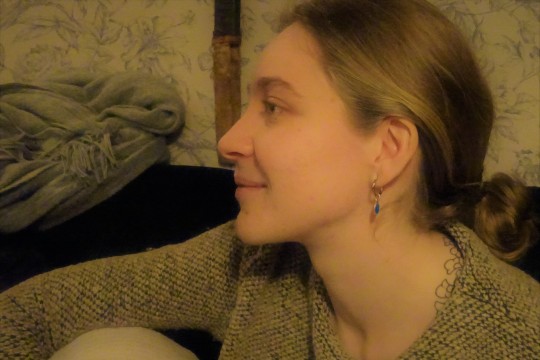
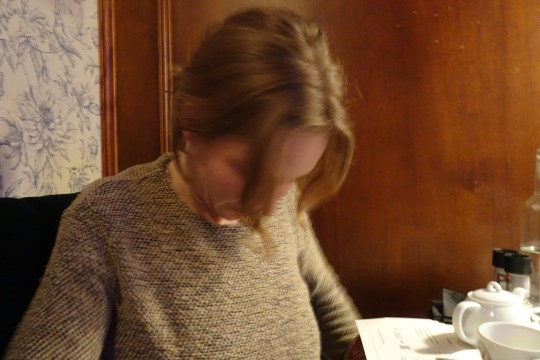
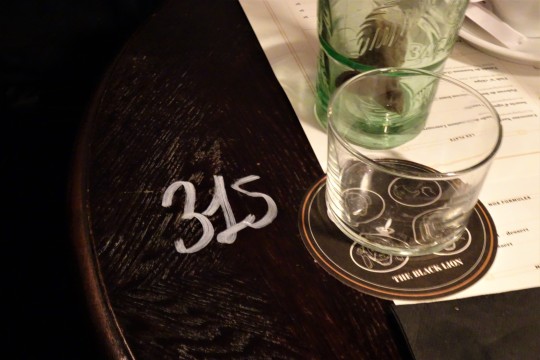
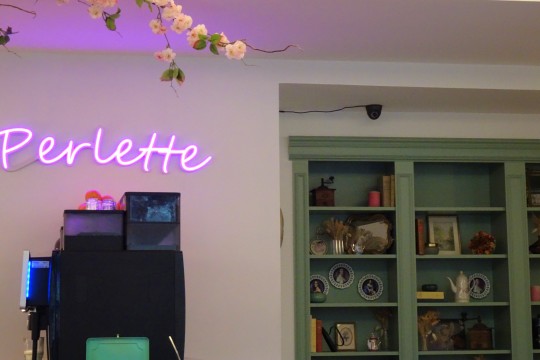

Vendredi
Ambiance hivernale en bord de Garonne, avant de retrouver Suzanne (@etreinte-froissee), et passer avec elle de la brume glacée à une chaleur douce, dorée, légère, souriante, d’abord au fond d’un restaurant des allées Paul-Feuga, puis en vitrine d’un salon de thé de la place de la Bourse. Honnêtement, nous nous sommes régalés, de mets savoureux et de mots choisis. Photographe et poétesse de grand talent, délicate et spontanée, cette amoureuse éprise de liberté portait aujourd’hui une petite Vierge bleue à l’oreille, et un pull ayant appartenu à Agathe (@ag-th), son amie qui est aussi la mienne. Comme le temps nous est toujours compté, en fin d’après-midi j’ai abandonné Suzanne à sa bicyclette rouge pour replonger dans l’hiver.
9 notes
·
View notes